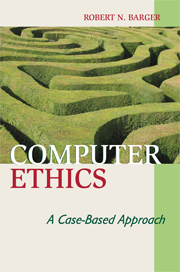Book contents
- Frontmatter
- Contents
- Preface
- Acknowledgments
- 1 Introduction
- 2 The Computer as a Humanizing Agent
- 3 Philosophic Belief Systems
- 4 A Philosophic Inventory
- 5 The Possibility of a Unifying Ethical Theory
- 6 The Ethical Decision-Making Process
- 7 Psychology and Computer Ethics
- 8 The Computing Field as a Profession
- 9 Computer-Related Codes of Ethics
- 10 Computer Ethics and International Development
- 11 Robotics and Ethics
- 12 Theft and Piracy Concerns
- 13 Cases Concerning Theft and Piracy
- 14 Privacy Concerns
- 15 Cases Concerning Privacy
- 16 Power Concerns
- 17 Cases Concerning Power
- 18 A Miscellaneous Collection of Cases
- 19 Parasitic Computing Case
- Appendix: Topics for Presentations, Discussions, and Papers
- Notes
- Selected Bibliography
- Index
17 - Cases Concerning Power
Published online by Cambridge University Press: 05 June 2012
- Frontmatter
- Contents
- Preface
- Acknowledgments
- 1 Introduction
- 2 The Computer as a Humanizing Agent
- 3 Philosophic Belief Systems
- 4 A Philosophic Inventory
- 5 The Possibility of a Unifying Ethical Theory
- 6 The Ethical Decision-Making Process
- 7 Psychology and Computer Ethics
- 8 The Computing Field as a Profession
- 9 Computer-Related Codes of Ethics
- 10 Computer Ethics and International Development
- 11 Robotics and Ethics
- 12 Theft and Piracy Concerns
- 13 Cases Concerning Theft and Piracy
- 14 Privacy Concerns
- 15 Cases Concerning Privacy
- 16 Power Concerns
- 17 Cases Concerning Power
- 18 A Miscellaneous Collection of Cases
- 19 Parasitic Computing Case
- Appendix: Topics for Presentations, Discussions, and Papers
- Notes
- Selected Bibliography
- Index
Summary
Google and Chinese Censorship Case
(© 2007 by Robert Newton Barger)
Google, Inc., opened its doors in 1998 in Menlo Park, California. It was founded by two graduate students from Stanford University, Larry Page and Sergey Brin. In less than ten years it has become arguably the largest information retriever in the world and has established an international presence. This case will deal with the ethics of Google's cooperation with the government of the People's Republic of China in practicing censorship.
Google's presence in China began in 2005 when it opened a research and development center there. In 2006 it began a localized domain in China. The name of the domain is Google.cn. People in China could make a search on Google.com before 2006, but it was only available to about half of China's users. If those users entered search terms that were censored by the Chinese government, such as “Tiananmen Square,” the site would immediately become unreachable for several hours. A Chinese government directive issued in September, 2000, says that Internet content providers must restrict information that may harm the dignity and interests of the state or that foster evil cults or that damage social stability. The Chinese government is said to have an extensive Internet filtering process in place that controls which overseas Web sites its citizens can access. With that filtering as a guide, foreign companies are expected to build their own lists of Web sites that would be deleted from Web search results.
With regard to Google's stance on censorship, Google says, “It is Google's policy not to censor search results. However, in response to local laws, regulations, or policies, we may do so. When we remove search results for these reasons, we display a notice on our search results pages.”
- Type
- Chapter
- Information
- Computer EthicsA Case-based Approach, pp. 207 - 215Publisher: Cambridge University PressPrint publication year: 2008



